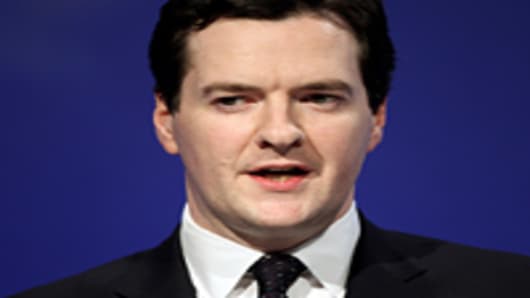With sluggish growth, an expanding budget deficit and fears of a downgrade, the U.K finance minister will next week use his Autumn Statement to update his plans for the economy with predictions emerging that a tax crackdown on multinationals could be on the cards.
Triple-A rated Britain is currently on a negative outlook with a review by Moody's due in early 2013 and HSBC says that Osborne's speech could be key if the U.K. is to avoid following France with a one-notch downgrade.
"The U.K. can only be given the benefit of the doubt for so long. The ratings agencies want to see debt metrics stabilize in the medium term. If fiscal pain is kicked too far
down the road, a downgrade is inevitable," HSBC's chief U.K. economist Simon Wells said in a research note.
"One obvious time for a re-appraisal of the U.K.'s growth potential and debt dynamics is around the Chancellor's Autumn Statement."
(Read More: Why a UK Downgrade Wouldn't Be a Big Deal)
On Tuesday gross domestic product (GDP) for the third quarter was confirmed at 1 percent over the previous quarter, but year-on-year GDP fell by 0.1 percent. Wells says a further deterioration in the growth outlook for Britain or a worsening of the debt-to-GDP ratio could cause the credit ratings agencies to act.
Fitch has previously warned that a trigger for a downgrade would be if debt-to-GDP touches 100 percent, a figure they believe Britain will come close to in 2015/16. Moody's meanwhile looks likely to downgrade the country if the debt-to-GDP ratio looks unlikely to fall in the next three to four years from its current level of 85 percent.
(Read More: France Is Dealt Another Downgrade — Who Is Next?)
Despite this, HSBC says positive factors are playing on Britain's side especially that it has control over its own currency (unlike the euro zone), and not forgetting that its government actually has a deficit reduction plan when compared with other nations.
But according to research firm Capital Economics, tax avoidance by foreign multinationals could be the real issue that needs to be tackled by Osborne.
(Read More: UK Lawmakers Slam Starbucks, Amazon and Google on Tax)
The U.K. government's budget deficit came in at 8.6 billion pounds for October compared to 5.9 billion pounds for the same time last year and the Capital Economics blames this on a drop in corporation tax receipts.
"High levels of capital expenditure by companies operating offshore — which can be written off against their tax bills — is estimated to have risen by 4-5 billion pounds in 2012," Capital Economics' Martin Beck said in a research note.
"Cracking down on perceived corporate malfeasance will no doubt be part of any revenue-raising announced at the Autumn Statement."
Multinationals such as Amazon and Starbucks have hit the headlines for the low amounts of corporation tax they pay in the U.K. The Autumn Statement is set to made by Osborne on December 5 at 12.30 p.m. London time.


